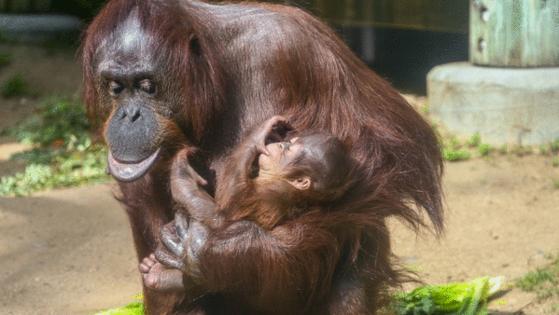Baby pictures: LA Zoo welcomes endangered Bornean orangutan
Published in News & Features
LOS ANGELES — The Los Angeles Zoo has announced the birth of a baby boy Bornean orangutan, the first such primate baby at the zoo in almost 15 years.
The unnamed auburn-haired infant was born Oct. 10, making him nearly 1 month old. He and mom Kalim spent the first few weeks behind the scenes. But they recently made their public debut at the Red Ape Rain Forest.
Visitors who want to see mom and baby bonding — with Kalim toting her newborn boy around, and the infant feeding — should try to visit their habitat first thing in the morning, according to a zoo spokesperson. The zoo, at 5333 Zoo Drive in Los Angeles, is open from 10 a.m. to 5 p.m.
Among primates, orangutans are second only to humans in how long they care for their offspring after birth. Orangutan moms maintain parental watch for as long as eight years. The zoo notes that the mammals share 97% of their DNA with humans; they make and use simple tools and can identify dozens of symbols for objects, numbers and commands.
This is the third offspring for 43-year-old Kalim and her first with dad Isim, 31. Kalim's daughter Elka is now 14, senior animal keeper Megan Fox said in a news release. With the new baby, visitors can "see unique behaviors and interactions that haven't been seen at Red Ape Rain Forest in a very long time," Fox said.
Orangutan, in Malay, means "person of the forest," the zoo noted. Bornean orangutans are considered "critically endangered" by the International Union for Conservation of Nature, the zoo says, with climate change as well as mining and clear-cutting of the animals' habitat causing their numbers to decline.
Orangutans spend 90% of their time hanging out in trees, using their grasping feet and long hands to make their way through the tree canopy. They're the largest arboreal mammals, and wild male orangutans can weigh as much as 220 lbs with an arm span of about 7 feet. The females are about half that size. In zoos, however, the animals can be 50 to 100 pounds heavier thanks to the consistent supply of food, according to the Smithsonian's National Zoo and Conservation Biology Institute.
The baby is yet unnamed, and the zoo spokesperson said, "We haven't decided yet if we're going to do a contest or naming opportunity."
Stay tuned.
©2025 Los Angeles Times. Visit latimes.com. Distributed by Tribune Content Agency, LLC.







Comments